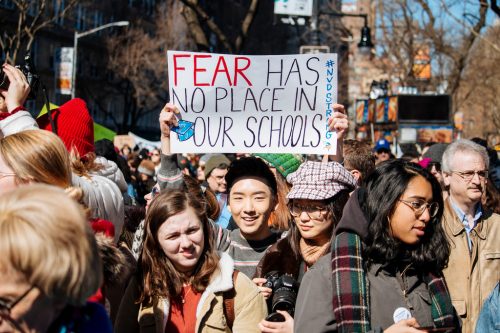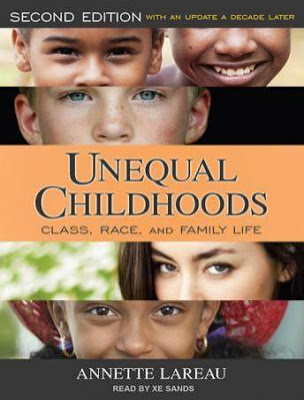Originally Posted at Montclair SocioBlog
A question that few people seem to be asking about Enough Is Enough and the March for Our Lives is: Why now? Or to paraphrase a question that some people soon will be asking: How is the shooting at Marjory Stoneman Douglas High School different from other school shootings?

There’s #MeToo and #Time’sUp, of course. These may have inspired advocates of other liberal causes like gun control. But just three weeks earlier, a 15-year old in Benton, Kentucky brought a handgun to school and started shooting – 2 dead, 18 injured. The incident evoked only the usual responses, nothing more.
Here’s my hunch: when I first saw the kids in Parkland speaking out, organizing, demanding that adults do something, I immediately thought of a sociology book that had nothing to do with guns –Unequal Childhoods by Annette Lareau published in 2003.
These high-schoolers, I thought, are the children of “concerted cultivation.” That was the term Lareau used for the middle-class approach to raising kids. It’s not just that middle-class parents cultivate the child’s talents, providing them with private coaches and organized activities. There is less separation of the child’s world and the adult world. Parents pay attention to children and take them seriously, and the children learn how to deal with adults and with institutions run by adults.
One consequence is the notorious sense of “entitlement” that older people find so distressing in millennials. Here is how Lareau put it:
This kind of training developed in Alexander and other middle-class children a sense of entitlement. They felt they had a right to weigh in with an opinion, to make special requests, to pass judgment on others, and to offer advice to adults. They expected to receive attention and to be taken very seriously.
It is this sense of entitlement – the teenager’s sense that she is entitled to have some effect on the forces that affect her life – that made possible the initial protests by the students at Marjory Stoneman Douglas High School. And once word of that protest spread, it was this same sense of entitlement, these same assumptions about their place in the world, that made so many other high school students join the movement.
Conservatives just could not believe that kids could or should be so adept at mounting an effective movement or that they could or should speak intelligently about political issues. So right-wing commentary insisted that the students were paid “crisis actors” or pawns of various forces of evil – adult anti-gun activists, the media, or the “deep state.” They also claimed that the students were “rude” and that they did not have standing to raise the issue of gun control.
[the students] say that they shouldn’t be able to own guns even though they can go to war, but they think that they should be able to make laws. None of this makes any sense at all. (See the excerpts in the transcript here.)
In a way, Fox and their friends are hauling out the old notion that children should know their place. But the motivation isn’t some newfound independence, it’s middle-class values. As Lareau says, concerted cultivation makes children far more dependent on parents than does the “natural growth” parenting more common in working-class families. Besides, foreign visitors since the early days of the republic have remarked on the independence of American children. What’s new, and what is so upsetting to exponents of older ideas, is how parents themselves have taught teenagers to demand that they have a say in the decisions that shape their lives.
Jay Livingston is the chair of the Sociology Department at Montclair State University. You can follow him at Montclair SocioBlog or on Twitter.


Comments 16
Patricia Munro — March 27, 2018
Yes, I too thought of concerted cultivation here. However, Lareau also looks at the institutional structures of school and government in contributing to an attitude of entitlement. Many have pointed out that the well-funded school and teachers had trained these students to be articulate and well-informed advocates. Others have pointed out--and this is something that Lareau does not address (not the topic, which given that the children she looked at were 10, is not surprising)--that these older students are using their privilege to include others. They want everyone to be safe, not only the already privileged. It's a lovely example of how privilege can and should be used.
E — April 1, 2018
It’s not so much that children should know their place. In my view it’s just depressing that our leadership is so weak that we must rely on our children to do what the adults should be doing. I want gun control, but I find tit depressing that children are fighting these battles. It’s not empowering and it’s not a good thing.
#whatiwore 2018w13 + Sunday links – Un Armario Verde — May 26, 2018
[…] My sociologist self loves unintended consequences! Here you have one: “Concerted Cultivation” and the March For Our Lives. […]
Bob Finistrat — November 17, 2020
The main function of a modern teacher is to use a creative approach. I don't like long lectures and text presentations. I love this informative site https://edubirdie.com/words-to-minutes-converter because it help to implement the correct educational approach. The concentration of the right information and short text is a real story.
Classification Essay — April 15, 2021
Thanks for rising such a great issue through your blog, keep it up.
get the best classification essay help only at : https://www.bestassignmentexperts.com/classification-essay
Kelly — June 24, 2021
This is not a simple enough topic that can be discussed for eternity. I recently wrote an essay on a similar topic with professional writers https://getfinanceessay.com/business-management-essay/
Howard — October 9, 2021
The shooter was reported multiple times: https://cutt.ly/ZElD1s4
They said on the news he had posted in a youtube comment that he was going to be a professional school shooter.
ffas — December 20, 2021
Amazing s
Imaginestudio — April 2, 2022
Imagine studio is top 3D Character Animation Studio. We have digital experiences. With more than thirteen years of knowledge and expertise we design.Our 3D designers are very potent and tend to develop high poly models as well as low poly models as per the prerequisite of our client. The most advanced tools and methods are used to create 3D character models that seem real and natural. 3D Character Modeling of Character is an art where you make a 3d character while using your skills and knowledge.
Dubai profitable business — October 12, 2023
We should always know our rights and raise voice for it.
sam — October 12, 2023
We should always know our rights and raise voice for it.
and do you know Dubai profitable business?
vixet — October 18, 2023
Keserwan, known for its captivating coastal beauty and vibrant culture, is the perfect backdrop for our apartments for sale. These properties offer an idyllic blend of modernity and tradition, with stunning sea views and proximity to local attractions. The apartments are designed to provide spacious, comfortable living spaces that cater to a diverse range of tastes and preferences. Embrace the Keserwan lifestyle in a serene and inviting setting, making these apartments an excellent choice for those seeking a balanced and rewarding living experience in this picturesque region check now apartments for sale in keserwan. Don't miss the chance to call Keserwan your new home.
Siana — November 16, 2023
The APK format is associated with Android apps. visit the latest iwhatsapp iphone apk and ensure you are following the appropriate steps to download WhatsApp on your iPhone.
SEO — May 12, 2024
Alriyady accounting services serve as a linchpin for financial success. From regulatory compliance and tax optimization to financial reporting and audit assurance, professional accounting firms offer a comprehensive suite of services tailored to the diverse needs of businesses operating in the region.
Ameliask — May 12, 2024
Today in Trend Ultimately, the question of whether Dofu Sports is legal depends on the specific circumstances and legal framework of the jurisdiction in question.
Brand Taylor — July 11, 2024
That's comparison article is really valuable.